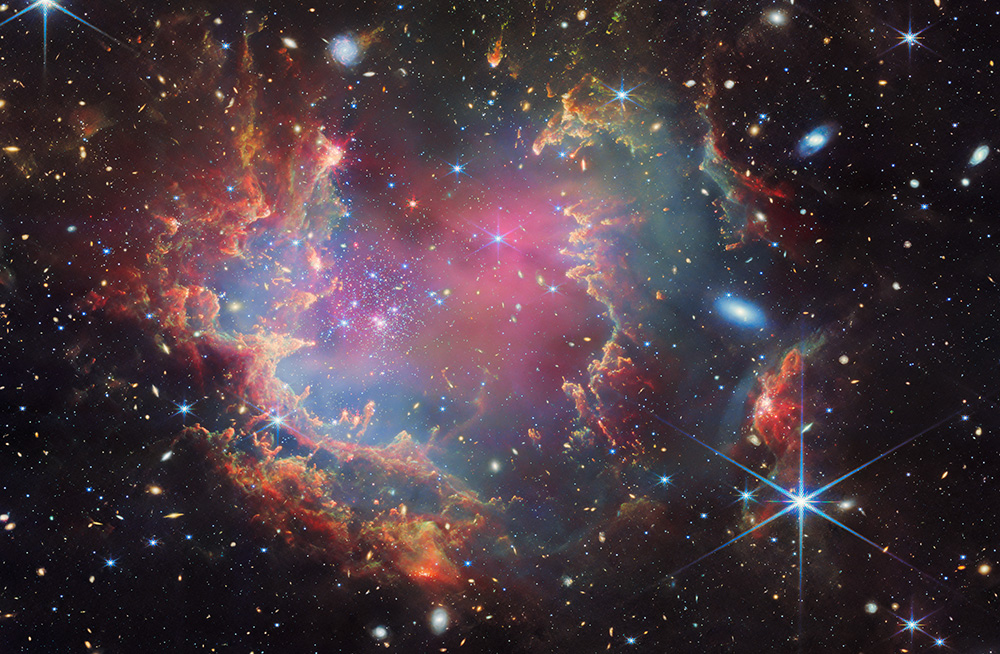
NGC 602, a young star cluster in the Small Magellanic Cloud in an image from NASA's James Webb Space Telescope (Flickr/ESA/Webb)
Don't you love the pictures we're getting from the James Webb telescope? We might consider them pinhole glimpses of God's view of the universe. Then, when we see how miniscule Earth appears in the grand scheme of things, God's love for this little world of ours is beyond comprehension.
Two citations from John invite us into the paradoxical mystery of God and our world. In John 3:16, we hear, "God so loved the world." And in John 18:36, Jesus says that his kingdom is not of this world. Is this a contradiction?
Philosophers of the New Testament era believed that the world was organized around polemos, which basically refers to power plays. When we look around, it seems that they were right. Kingdoms, nations, classes, teams and even siblings too often base their identity on winning in contests or conflicts.
That's the world Jesus was talking about when he responded to Pilate about his kingdom. In the world of polemos, Jesus would not have gone down without a fight. But domination was not his way. Never!
What, then, are we celebrating when we call Jesus "the king of the universe"?
To start with, we can consult Daniel, a prophet whose message many see as referring to Jesus. In today's first reading, Daniel sees one like a "Son of man" (a genuine human being) appearing before God to receive "dominion, glory, and kingship." What do those look like in a kingdom not of this world?
How did Jesus demonstrate dominion? We get a glimpse of his dominion through the signs/miracles that he performed. The Gospel of Mark tells us that after winning a battle of wits with the tempter in the desert, Jesus' first public act was to heal a man with an unclean spirit (Mark 1:21-28). Every "sign" that Jesus performed followed that pattern. He faced the demons afflicting his people and expelled them, attributing every miracle to the faith of the recipients.
We might say that when Jesus exercised dominion over evil, it was generally by awakening people's faith. His dominion was invitational — he couldn't help anyone who didn't want to be helped.
What about Jesus' glory? In John's Gospel, Jesus' glory reflects the greatness of God. Jesus insists that his is the glory of the one who sent him. Yet, his glory is obvious only to those who believe in him (John 1:12, 14; 8:50).
If we asked John about how he saw Jesus as king, he would say, "Read my Gospel." In his opening chapter, when Nathaniel called him the King of the Jews, Jesus replied that he had seen nothing yet — much bigger revelations were in store (John 1:49-51).
Later, when people wanted to make him king, Jesus fled from them because their hope centered on their stomachs, not their hearts (John 6).
Advertisement
According to John, Jesus' definitive revelation of his unworldly kingship happened in the events of his passion and resurrection. Jesus the King rode into Jerusalem on a donkey, not on a ruler's horse. When Pilate asked him if he were the king of the Jews, Jesus' answer was consistent with all he had said and done: "I am a king in a way you may never understand."
Our selection from Hebrews sums up Jesus' kingship with the opening line: "Jesus Christ is the faithful witness." Jesus, the son of man, offers incredulous human beings a faithful reflection of God's own power; he presents an image that is most certainly not of this polemical world.
Jesus said, "If my kingdom did belong to this world, my servants would be fighting for me." This leaves us with the question, "What are we, his servants, supposed to do instead of playing by the rules of this world?"
If we want to participate in Christ's unworldly kingdom, we need but follow the leader. Christ is the genuine human being, the son of humanity, because he is the image of his all-loving creator. He leads by attraction, never by imposition. Faith and love are the sole reasons for seeking to participate in his reign.
In his reigning among us, Christ offers a share of his glory, a glory that we can begin to comprehend and experience only in faith. It is unintelligible to those who choose to remain outside.
Christ the King invites us, not into an otherworldly experience, but into a transforming alternative to the world of polemics. Today's feast poses one demanding question to us: "Do we want to bet our lives on the kingdom of God?" It's an all or nothing choice.
